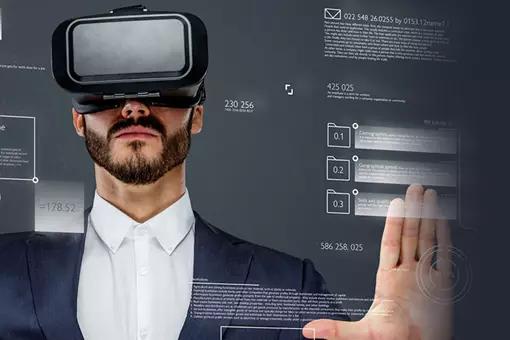How Virtual Reality Is Transforming Business Education
- 27th October 2025
- Written by LSBF Staff
- Innovation & Technology

The landscape of business education, long dominated by case studies and lectures, is undergoing a profound VR Transformation. As the pace of global business accelerates, traditional methods often struggle to prepare students for complex, real-world scenarios. Enter Virtual Reality (VR), a technology that is reshaping how future leaders learn, collaborate, and practice the art of management.
Exploring Virtual Reality (VR) in Modern Learning
Virtual reality in education is no longer a futuristic concept; it is a practical tool. It provides a fully immersive and interactive virtual reality experience that replaces passive consumption of information with active participation. By donning a VR headset, students are transported from a static classroom into dynamic 3D environments, from a bustling stock exchange floor to a challenging board meeting, significantly boosting student engagement.
What is Virtual Reality (VR) in Business Education?
In business education, VR leverages virtual reality technology to simulate realistic business environments, scenarios, and challenges. Instead of reading about an operational crisis, students can experience it firsthand within a safe, digital space. For institutions like the London School of Business and Finance offering an online MBA programme, this integration of virtual reality technologies is crucial for delivering the high-touch, practical learning often reserved for on-campus degrees.
Importance of Virtual Reality in Business Education
Modern business education requires more than theoretical knowledge; it demands experiential learning. Virtual reality in business education provides this bridge. As the VR education market expands, its importance lies in its ability to foster leadership, negotiation, and cross-cultural communication skills in a contextually rich setting that traditional methods simply cannot replicate.
Start Your Business Education Application at LSBFWhy Business Education Needs VR Transformation
The world of work is digitised, globalised, and increasingly complex. Business education needs a VR Transformation because:
-
Complexity Requires Simulation: Explaining a global supply chain disruption is less effective than having students virtually manage the crisis in real time.
-
Generational Expectations: Today's students expect interactive learning through VR tools that align with modern MBA trends.
-
The Rise of Remote Learning: VR is essential for making online MBA programme experiences as robust and networked as their physical counterparts, offering the same benefits of an online MBA.
Benefits of Virtual Reality in Business Education
The benefits of virtual reality are numerous, focusing heavily on depth of knowledge and practical skill application.
-
Enhanced Learning: The immersive nature of VR increases memory retention and deepens conceptual understanding.
-
Risk-Free Training: Students can practice high-stakes decisions—like major investment choices or difficult HR negotiations—without any real-world consequences.
-
Time Savings: Complex physical visits or setups (like factory floor tours) can be instantly executed in a VR simulation.
-
Global Collaboration: VR allows students from different parts of the world to meet in a shared virtual boardroom, fostering international teamwork.
-
Improved Skill Development: It is highly effective for soft skills training, such as public speaking in front of a virtual reality experience audience.
-
Understanding of Complex Concepts: Abstract financial models or intricate organisational structures become tangible and navigable.
-
Scalability and Customisation: A single VR scenario can be easily scaled up for hundreds of students and customised to specific industries or learning objectives.
Challenges of Virtual Reality in Business Education
Despite the many benefits of virtual reality, implementation faces hurdles. The main challenges of virtual reality include the high initial cost of headsets and infrastructure, the need for specialised content creation, and the logistical challenge of overcoming motion sickness for some users. Furthermore, faculty must be trained to effectively utilise this sophisticated virtual reality technology in their curriculum.
The Future of VR in Business Education
The future of VR in business education is collaborative, predictive, and personalised. We are moving towards persistent, metaverse-like learning environments where students build long-term business relationships in virtual offices. As the VR education market matures, expect more institutions to integrate these tools, offering unprecedented MBA opportunities and preparing graduates with unparalleled practical exposure.
FAQs
How is VR different from traditional business education methods?
Traditional methods are largely passive (reading, listening). VR is active and experiential, offering a complete virtual reality experience where students do rather than just hear about business actions.
How does VR improve student engagement in MBA programmes?
VR captures the users’ full attention in a simulated world, increasing their emotional and cognitive investment in the learning task, thus maximising student engagement.
Does VR in business education prepare students for the metaverse?
Yes, by training students to collaborate, present, and manage in 3D digital spaces, virtual reality in education is directly preparing them for the next evolution of online work and commerce in the metaverse.
What role does VR play in cross-cultural business training?
VR can instantly simulate diverse cultural settings and team dynamics, providing a risk-free environment for practicing sensitive cross-cultural negotiation and communication—a key part of global opportunities.
Image Credit: Freepik
Other News
The Role of Technology in Modern Finance Education
Today, financial education must mirror the technological Reality of the industry. At institutions like the London School of Business &…
How Virtual Reality Is Transforming Business Education
Virtual reality in education is no longer a futuristic concept; it is a practical tool. It provides a fully immersive…
How Us Tariff Announcements Are Shaping Global Markets
Recent US tariff announcements have sent shockwaves across the global economy, becoming a dominant factor in international trade discussions. Understanding…




